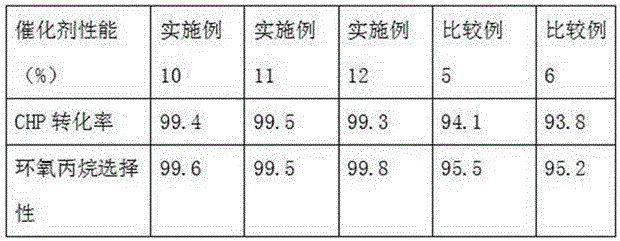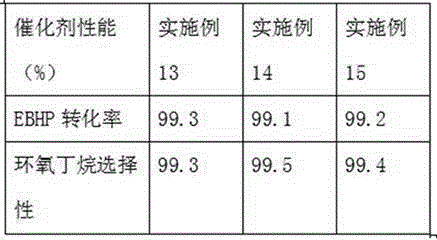Method for preparing molecular sieve based catalyst
A molecular sieve and catalyst technology, applied in the field of molecular sieve catalyst and molecular sieve catalyst preparation, can solve the problems of poor catalyst stability, uneven distribution of catalyst active centers, fast deactivation rate, etc., to reduce production cost and production cycle, and achieve excellent selectivity. and stability, the effect of solving mass transfer problems
- Summary
- Abstract
- Description
- Claims
- Application Information
AI Technical Summary
Problems solved by technology
Method used
Image
Examples
Embodiment 1
[0017] At room temperature and under stirring, add a mixed solution of silicon source tetraethyl orthosilicate, bis(triethoxysilyl)methane and trimethoxysilane, which accounts for 70% of the total amount to be added, to the template agent 16 Alkyltrimethylammonium bromide, mineralizer tetraethylammonium hydroxide and water mixed solution for hydrolysis to form a colorless and transparent solution I; the remaining 30% silicon source tetraethyl orthosilicate, di( Triethoxysilyl)methane and trimethoxysilane are mixed and then fully mixed with titanium source tetrabutyl titanate to form a mixed solution II; at -5°C and under rapid stirring, slowly add solution II to the solution In Ⅰ, a light yellow transparent solution was formed, and continued to stir for 1 hour, which was recorded as solution Ⅲ; solution Ⅲ was transferred to a stainless steel autoclave for crystallization treatment, the crystallization temperature was 140°C, and the crystallization time was 72 hours. The crysta...
Embodiment 2
[0020] Compared with Example 1, only in the molecular sieve preparation process, the amount of tetrabutyl titanate added was reduced. The composition relationship of the amount of each substance is [(CH 3 ) 3 CH 3(CH 2 ) 15 N + ]Br - : [(CH 3 CH 2 ) 4 NH 4 ] + Oh - :Si(OC 2 h 5 ) 4 :(C 2 h 5 O) 3 Si-CH 2 -Si(OC 2 h 5 ) 3 : CH 3 Si(OCH 3 ) 3 :Ti(OC 4 h 9 ) 4 :H 2 O =0.3:0.4:1:0.3:0.1:0.03:10 (molar ratio).
[0021] The ultraviolet-visible (UV-Vis) spectrum of the molecular sieve catalyst has a strong absorption peak around 215 nm, and no absorption peak exists at other wavelengths. Its infrared (FT-IR) spectrum is at 960cm -1 There is an obvious absorption peak. More than 95% of the pores have a pore size greater than 2 nm.
Embodiment 3
[0023] Compared with Example 1, only in the molecular sieve preparation process, reduce (C 2 h 5 O) 3 Si-CH 2 -Si(OC 2 h 5 ) 3 added amount. The composition relationship of the amount of each substance is [(CH 3 ) 3 CH 3 (CH 2 ) 15 N + ]Br - : [(CH 3 CH 2 ) 4 NH 4 ] + Oh - :Si(OC 2 h 5 ) 4 :(C 2 h 5 O) 3 Si-CH 2 -Si(OC 2 h 5 ) 3 : CH 3 Si(OCH 3 ) 3 :Ti(OC 4 h 9 ) 4 :H 2 O =0.3:0.4:1:0.2:0.1:0.04:10 (molar ratio).
[0024] The ultraviolet-visible (UV-Vis) spectrum of the molecular sieve catalyst has a strong absorption peak around 215 nm, and no absorption peak exists at other wavelengths. Its infrared spectrum (FT-IR) is at 960cm -1 There is an obvious absorption peak. More than 95% of the pores have a pore size larger than 2 nm.
PUM
 Login to View More
Login to View More Abstract
Description
Claims
Application Information
 Login to View More
Login to View More - R&D
- Intellectual Property
- Life Sciences
- Materials
- Tech Scout
- Unparalleled Data Quality
- Higher Quality Content
- 60% Fewer Hallucinations
Browse by: Latest US Patents, China's latest patents, Technical Efficacy Thesaurus, Application Domain, Technology Topic, Popular Technical Reports.
© 2025 PatSnap. All rights reserved.Legal|Privacy policy|Modern Slavery Act Transparency Statement|Sitemap|About US| Contact US: help@patsnap.com



